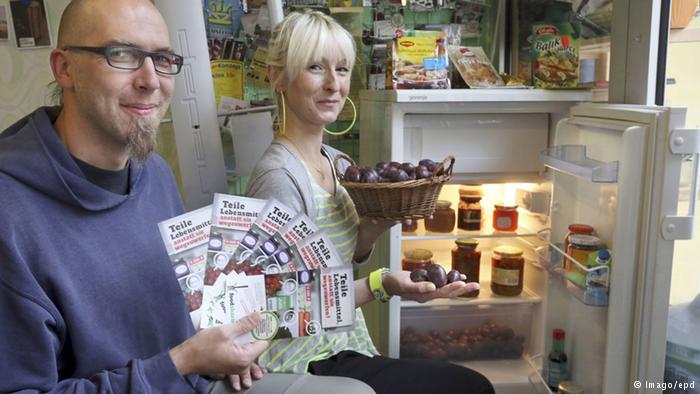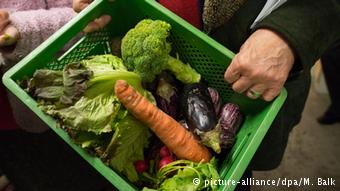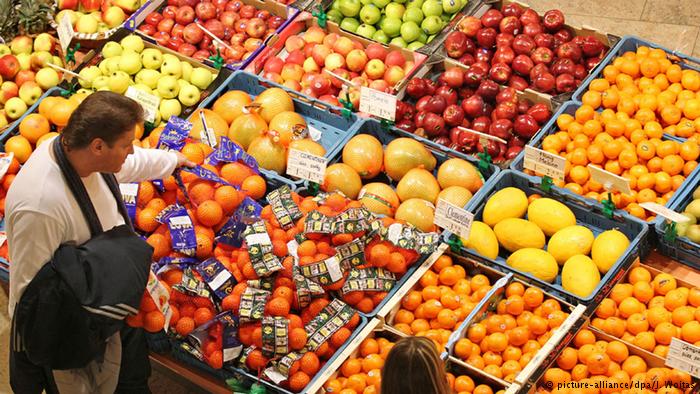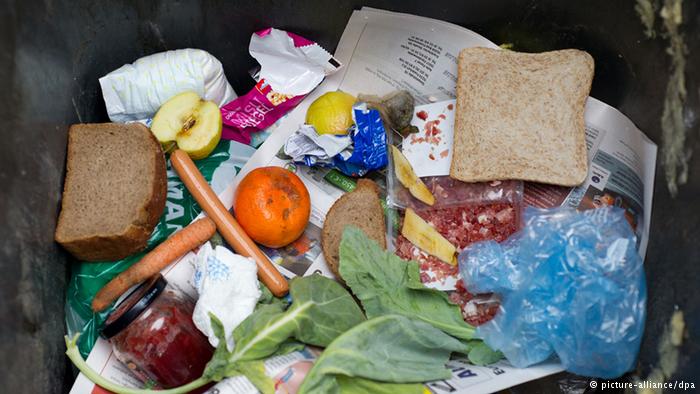Diet
Fairteilen before?
What to do with leftover food, which is not consumed anymore? In collection points and submit them to the General public. But Berlin authorities make the action of sharing of food in question.

Frank Bowinkelmann has from the newspaper, “that against us massive action is taken.” Photos are evidence: they show wilting salad, non-packaged bread and a milky liquid in the fridge, which has not been declared. All these defects have the employees of the Berliner Lebensmittelaufsicht documented.
Bowinkelmann, member of the Board of the Association Foodsharing, confirmed the critique of the Amtsprüfer. Yet he can not understand that the authorities are now completely hygienic concerns lead the project to Failure could bring. “Any wilted outer leaves of a lettuce is not a health risk. You can however, remove”, has Bowinkelmann in the DW-interview the allegations. Also there were Goods in household quantities only for a short time on the shelves.
Since 2012, there are common refrigerators, so-called Fairteiler. “People who are in Foodsharing join in, make the equipment on. The Initiative has a very decentralized structure. However, there are clear rules.” The Fairteiler its many places of social meeting place for buyers, says Bowinkelmann. But also the needy could access without having to be stigmatized. In 62 cities, there are 300 public refrigerators. The action has been in many countries copied.
“Taste the Waste” as a model
Bowinkelmann was begun, the gigantic food waste to counteract. ‘Taste the waste’ – the Film of his colleague Valentin Thurn, had the filmmakers shaken up. The documentary made in 2011 on the international Lebensmittelvernichtung attention.

Mehrwegkiste with vegetables, the in the business sorted out has been
But since then, not much has changed: A third of all food to be thrown away. In Germany land – depending on the indication, between eleven and 20 million tons of fruit, vegetables, dairy products and canned food in the garbage, although they still verzehrfähig would be. In the Federal state of North Rhine-Westphalia has been working for five years, a round table on action against the throwaway culture. At the end of January called North Rhine-Westphalian environment Minister, Johannes Remmel, a national strategy for reduction of food waste and appealed to the competent Federal agricultural Minister Christian Schmidt, for a European solution in order to use resources such as energy, water, and soils – will no longer be wasted.
In “taste the Waste” were Mülltaucher shown in bins of the supermarkets (illegally) for food search, the dealer disposed of. Frank Bowinkelmann and his collaborators had an obvious idea: you animated institutions, refrigerators, and shelves in public places set up in every food it can be still edible, but no longer needed. Each Consumer is allowed free on the range to operate without certificate of eligibility. The different Foodsharing of the “boards”. For the nationwide Initiative, will receive citizens on state aid are dependent, food if you submit a Sozialpasses.
Strict hygiene standards
For Foodsharing, different rules apply to: churches, schools, universities are allowed to “Fairteiler” set up, but not parties. Foods such as raw meat or products from non-heated milk, a potential risk to human health bergen, may as well as alcohol are not to be donated.

Much for the eye, too much for consumers
Additional rules: refrigerators must always be tightly closed and at a temperature of 5 degrees Celsius. The operator must undertake the equipment at least once per week with water and sechsprozentiger Essigwasserlösung to clean and about a Hygieneprotokoll to create.
How will it continue?
Four years the System worked smoothly, says Bowinkelmann. Until the Berlin authorities because of possible health concerns signed up. For consumer protection in the Federal capital, competent Secretary of state, Sabine Toepfer-Katav told the German press Agency (dpa) that are also legal objections to the refrigerators. The Share of food in other cities as a share of private individuals is considered, you want to in Berlin to check whether the provider for food, because by law, as such, is classified, “the food in the market, no matter whether for money, donation or free of charge”, so Topefer-Katow.
As a food business would be the Association Foodsharing apply, because its refrigerators on public land and accessible to everyone unattended. The result could be that the authority requires that a registered charge donor and the donations are documented. A claim that the Association cannot meet. The Berlin authorities want to protect themselves, because in the past, publicly poisoned liquor and manipulated biscuits have been distributed.
“There is the principle, no legal basis”, says Egbert Lechtenböhmer, head of the Department of food inspection and veterinary services of the city of Cologne. “We have the state office with a letter and precept asked.” The competent office in Duisburg had no objections, explained Frank Bowinkelmann.

In the ton? Garbage-food waste
Bowinkelmann and his colleagues now want to different ways to try, the refrigerators on private land to install. However, should the evening be closed, claiming the Berlin authorities. “It is fatal, that of all the people of the capital of such a Signal”, he shows himself to be disappointed. “The people who, out of shame unobserved supply would then no longer enjoy the benefits of free Goods.”
It should Foodsharing not succeed to find a solution, will be back for more food in the waste land, and the needy, the free operated, the company is no longer supplied.
Maybe soon there will be Restaurants, the thrown-away food. The idea of such Non-Profit companies there are already. She comes from Berlin. Have a name, the initiators also: Completely happy. Only with the implementation of it falls short.


